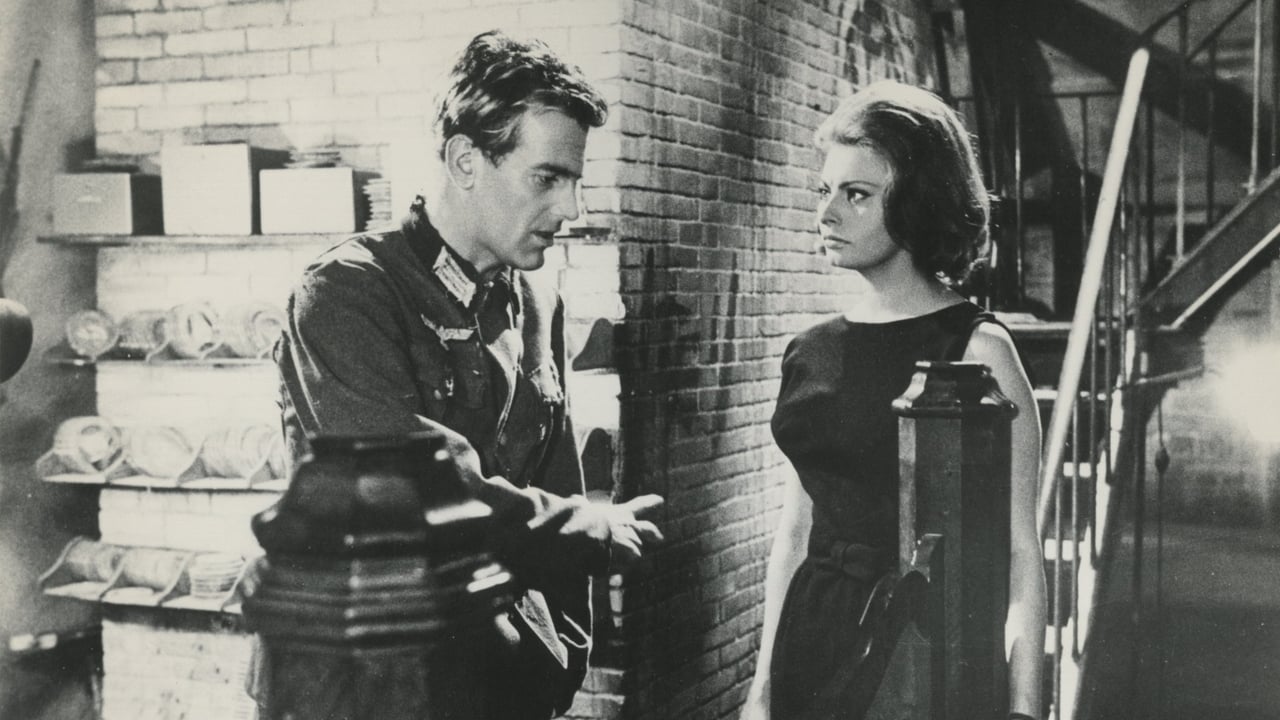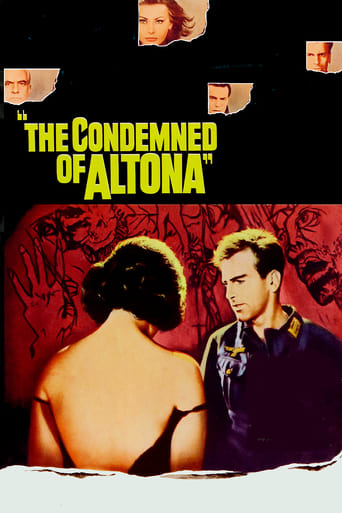Inclubabu
Plot so thin, it passes unnoticed.
Cleveronix
A different way of telling a story
Micah Lloyd
Excellent characters with emotional depth. My wife, daughter and granddaughter all enjoyed it...and me, too! Very good movie! You won't be disappointed.
Haven Kaycee
It is encouraging that the film ends so strongly.Otherwise, it wouldn't have been a particularly memorable film
se-24406
There was a small theater in Shelby NC that showed "art house" films on Sunday afternoon. Films like Bergman's "The Virgin Spring", The "L Shaped Room" with Leslie Caron and "The Condemned of Altona" with Maximlian Schell, Sophia Loren, Robert Wagner and Fredric March. "The Condemned of Altona" was dark and arresting, as only a black and white film can be. This film pulled you in and would not let go and many who have seen it have never forgotten.One puzzled at how the family pulled off the hidden son, supplied him with custom printed newspapers and kept him virtually a prisoner in order to keep him from the post war tribunal, be judged a war criminal and be imprisoned. The irony is inescapable. But the power of wealth makes any thing within reach of the wealthy, including keeping a war criminal secreted way for decades. This is a superb film and really should be available on DVD.
bkoganbing
Perhaps because I saw this film dubbed in Italian with English subtitles and missed the familiar voices of Fredric March, Maximilian Schell, and Robert Wagner I was put off somewhat. But The Condemned Of Altona just did not rise to what I was expecting. Or maybe it was Jean-Paul Sartre's view of the world.Whatever it was his ideas just did not translate well to the big screen. Meet the family Gerlach, father Fredric March big German industrial tycoon and his children Maximilian Schell, Robert Wagner, and Francoise Prevost. Germany may have lost the war, but her natural resources and the need for an anti-Communist bulwark in the Cold War have made her richer than ever, if de-Nazified. March has been told he's terminally ill and has six months tops. He's troubled about his choices. The younger son Robert Wagner is not fit material for a tycoon and in the patriarchal society Francoise Prevost is out of the question.Then there's Maximilian Schell who has self secluded and deluded. He's a wanted war criminal from World War II and he's imposed an exile on himself. He believes because he knows no better that Germany is a vast rubble.Bringing him out of his exile is Wagner's new wife Sophia Loren who's been wondering about that locked section of that Gothic manor the Gerlachs have for themselves.As for the rest all I can say is Schell's guilt is the engine that drives the rest of the film. The best part of the film is something that could not be done on stage. Schell finally lose and seeing with his own eyes, the prosperity and the bustling night life that was Hamburg. Wonder if he went to the clubs and found some musicians from Liverpool who would shake the world soon?I did see this on stage at Lincoln Center a couple of years after the film had been made of Jean-Paul Sartre's play with George Coulouris heading the cast as the family patriarch. As he is often on screen, Coulouris was mesmerizing in self absorption and monomania about seeing his industrial complex carrying on. By contrast March seemed dull and lifeless and this has to rank as one of his lesser films. But not to single him out alone, the whole cast was the same way with the exception of Schell. But he's got the best part of a man who had to enlist in the army after his father got him off from protecting a Rabbi to a man who committed war atrocities on the Russian front.Sartre was saying that war itself can make people do evil things. And that the true guilty parties never saw any punishment, on the contrary like March they triumphed in defeat.In other words, what a world.
garybehun
I saw this movie on the big screen several years ago in San Diego and I've never forgotten it. This movie falls loosely within the Holocaust/antisemitic genre and I'm surprised that many of my fellow Jews have never even heard of it. The idea of a family keeping their ex-Nazi son in the attic (it's not the basement)to protect him from the public is intriguing to say the least. There are a few scenes that I can never forget: Max Schell still wearing his Nazi uniform; his sister wiping up his excrement off the floor, like the family pet; Schell unwrapping and eating chocolate that's wrapped in Nazi tinfoil. To be kept away all these years from communicating with the outside world that's changed so much from the Nazi era. The last scene with Schell and Frederick March standing above the industrial complex that's been created. All these scenes stand out in my mind. The stark black and white film ties in exactly with that dark period in German/Jewish history. I'll never forget this movie. I wish so much that it is someday available in a DVD or (please don't) VHS version--even a copy from a TV movie showing on, say, the Fox movie channel. Anybody have a copy for sale? Contact me.
mlraymond
I only saw this film once, nearly forty years ago, on television. I later read the original Sartre play in a drama class, and found that the movie was reasonably faithful to the original. It is apparently unavailable on home video, unfortunately.I remember being fascinated by the compelling performance of Maximilian Schell as the former Nazi officer who is believed dead, but actually hiding out in his family's attic. His sister, for some reason ,lets him think the war is still going on, twenty years later. She reads him made-up news bulletins about the Allies' destruction of Germany, feeding his madness.The most memorable scene was when the recluse Schell left the house, and went out into the city for the first time in twenty years or more. People stare and laugh at him, as he walks around the modern city in his old Nazi uniform. He is bewildered by all the modern buildings and signs of prosperity in a Germany he had believed utterly destroyed forever.In a particularly clever touch, he somehow ends up in a theater, where a Nazi era satire is being performed. The modern German audience laughs at the caricatured Hitler and his followers. As a kid, I realized it was some kind of Hitler spoof, but the whole thing was in German, and I had to guess at its significance. I now believe that it was most likely a play within a play, namely a scene from the climax of Bertolt Brecht's The Resistible Rise of Arturo Ui. It's been a long time since I saw this film, but it seems to me that Schell, in his madness and confusion, mistakenly believes it's some kind of real Nazi rally, and starts saluting "Hitler" , while the audience thinks he's part of the show. It's unfortunate that this movie isn't available for a new audience to appreciate. With any luck, it will come to home video eventually.

